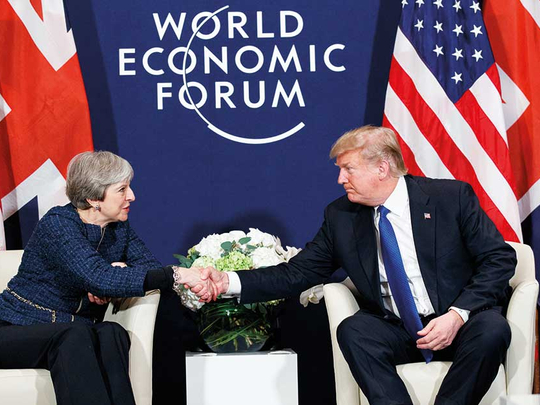
DAVOS
“The United States is doing very well,” President Donald Trump told reporters in Davos on Thursday, adding he’s “very excited to be here.” The US will “continue to do well and this will be a very exciting two days,” he said entering meeting with UK Prime Minister Theresa May.
A day after sending the dollar reeling with comments supportive of a weak US currency, U.S Treasury Secretary Steven Mnuchin said the Trump administration was not seeking a trade war but would defend its economic interests.
At a news conference at the World Economic Forum in Davos, Mnuchin played down his comments on Wednesday that a weaker dollar was “good for us as it relates to trade and opportunities”, saying they had been “balanced and consistent”.
The remarks were seen by markets as departing from traditional US currency policy and elicited thinly veiled warnings from European finance ministers, as US. President Donald Trump arrived in Davos to promote his “America First” agenda.
Trump is due to speak on Friday, the final day of the four-day gathering of CEOs, bankers, academics and celebrities which has become a synonymous with the “global elite” that the president has railed against.
“I thought my comment on the dollar was actually quite clear yesterday,” Mnuchin told reporters. “I thought it was actually balanced and consistent with what I’ve said before, which is, we are not concerned with where the dollar is in the short term.” Mnuchin said there were “both advantages and disadvantages of where the dollar is in the short-term” and stressed that the United States wanted fair economic competition.
“We want free and fair and reciprocal trade. So I think it’s very clear. We’re not looking to get into trade wars. On the other hand we are looking to defend America’s interests.” But the finance ministers of France and Italy expressed concerns about Mnuchin’s remarks, which pushed the dollar down to multi-year lows.
Monetary policy
A stronger euro, hovering at a three-year peak against the dollar, could hurt the European economy by making its exports less competitive. It also risks complicating the European Central Bank’s exit from years of ultra-loose monetary policy.
“We want currency levels to reflect economic fundamentals,” French Finance Minister Bruno Le Maire told reporters in Davos, saying this was the official position of the Group of Seven, of which the United States is a member. “We hope that it remains the common position because it is the responsible position from an economic point of view.” His Italian counterpart Pier Carlo Padoan said Mnuchin’s comments reminded him of American policy in the 1970s and expressed concern about a trade war.
Predatory
After Mnuchin’s remarks on Wednesday, Commerce Secretary Wilbur Ross denied his colleague was advocating a weaker dollar, but when asked about the risk of trade wars, he told CNBC: “Trade war has been in place for quite a little while, the difference is the US troops are now coming to the ramparts.” Speaking at the Thursday morning news conference, Ross said: “People are using some predatory practices against us and we’re not flinching from that.” The comments came a day after European leaders, without specifically mentioning the United States, warned against a rise in nationalism and protectionism.
Chinese Foreign Ministry spokeswoman Hua Chunying told a regular news briefing in Beijing on Thursday that the country’s leaders were committed to openness.
“I believe everyone has already noticed that at the end of last year China has taken real steps to greatly loosen its financial industry, market access and others,” she said.
Mnuchin said he had met the economic adviser to Chinese President Xi Jinping and had a “very good and open dialogue”, talking about North Korea sanctions and trade.
“We’re working together on the issue of the trade deficit in a mutual desire to shrink the trade deficit. We talked about some very specific ideas that we both have on that.” Asked about negotiations between the United States, Canada and Mexico to rework the North American Free Trade Agreement (NAFTA), Ross said it was more important to get a “proper deal” than a quick agreement.












